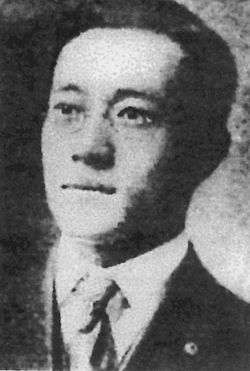Wang Zhengting
Wang Zhengting (Chinese: 王正廷; pinyin: Wáng Zhèngtíng; Wade–Giles: Wang2 Cheng4-t'ing2, known in English as Chengting Thomas Wang or C. T. Wang; 7 September 1882 – 21 May 1961) was Foreign Minister, Minister of Finance, Minister of Justice and acting Premier in governments of the Republic of China in the 1920s.
Wang Zhengting | |
|---|---|
王正廷 | |
 | |
| Premier of the Republic of China Acting | |
| In office 11 December 1922 – 4 January 1923 | |
| Preceded by | Wang Daxie (acting) |
| Succeeded by | Zhang Shaozeng |
| Personal details | |
| Born | 7 September 1882 Fenghua, Chekiang |
| Died | May 21, 1961 (aged 78) British Hong Kong |
| Nationality | Republic of China |
Early life
Wang was born in Fenghua, Zhejiang, and his father was an Anglican minister just outside Shanghai, where Wang attended mission schools before entering the preparatory school for the Peiyang University. After teaching in the Provincial High School in Changsha, Hunan. Wang studied in Tokyo, where he was secretary of the Chinese YMCA, then in 1907, went to the United States to study law at the University of Michigan.[1] He soon transferred to Yale University, graduating in 1910 and being elected to Phi Beta Kappa.
Life in government
Wang returned to Shanghai in June, 1911, and took another position with the YMCA before being recruited to join the new Republican government in Beijing, then in Sun Yat-sen's opposition government in Canton.[2]:362-3
He represented the interim Canton government in China's delegation, headed by Lu Zhengxiang, at the Paris Peace Conference, 1919 after World War I.[3] He and Wellington V K Koo (Gu Weijun), another US-educated lawyer, played prominent roles in presenting the case for returning Shandong to China and in the decision not to sign the Treaty of Versailles because it stipulated the transfer of German rights in Shandong to Japan.[4]:113 Notwithstanding their competitive positions domestically, Wang and Koo joined forces in staunchly promoting the formation of the League of Nations, jointly authoring a pamphlet on the subject.[5]:244
Wang served as foreign minister, minister of finance, minister of justice and acting premier for various short periods of time from 1924–1928, before serving as foreign minister until 1931. He also founded a Shanghai brokerage house; was chairman or board member of mining, cotton milling, and railroad companies; and was Chairman of the Far Eastern Olympics. As foreign minister, Wang negotiated a settlement with Japan over the Jinan Incident of 1928; with Soviet Russia over the Chinese Eastern Railway in Manchuria; treaties restoring Chinese territory in British Weihaiwei and French Tonkin; and tariff autonomy or commercial agreements with more than a dozen countries, including Japan.[2]:363
Sports
Wang was a keen athlete who fervently believed in sports as a vehicle for national development. He represented China at the Far Eastern Championship Games in 1913[6]:210 and was later to be the first Chinese member of the International Olympic Committee.[1]
Later life
In spite of his successes in nationalist diplomacy, after the Mukden Incident of 1931 in which Japan seized control of China's Northwest provinces, student protestors targeted Wang for China's ineffective response. Wang was attacked and hospitalized, and withdrew from public office for a time. Wang was Ambassador to the United States from 1936 to 1938. He served in various minor government and party capacities during the war, but in 1949 stayed in Hong Kong rather than go to Taiwan with Chiang Kai-shek's government.[2]:364
References
- "U-M Chinese Alumni". College of Literature, Science and the Arts, University of Michigan. Retrieved 22 December 2018.
- Howard Boorman, ed. (1970). Biographical Dictionary of Republican China. III. New York: Columbia University Press. ISBN 9780231089579.
- Xu, Guoqi (2005). China and the Great War: China's Pursuit of a New National Identity and Internationalization. Cambridge University Press. p. 255.
- Manela, Erez (2007). The Wilsonian Moment: Self-Determination and the International Origins of Anticolonial Nationalism. Oxford University Press. ISBN 9780195176155.
- Matten, Marc Andre (2016). Imagining a Postnational World: Hegemony and Space in Modern China. BRILL. ISBN 9789004327153.
- Kowner, Rotem; Demel, Walter (2015). Race and Racism in Modern East Asia: Interactions, Nationalism, Gender and Lineage. BRILL. ISBN 9789004292932.
| Wikimedia Commons has media related to Wang Zhengting. |
| Political offices | ||
|---|---|---|
| Preceded by Wang Daxie |
Premier of the Republic of China 1922–1923 |
Succeeded by Zhang Shaozeng |